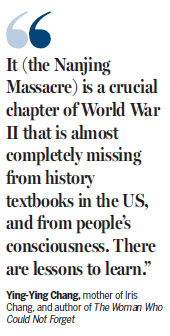Iris Chang: A light in the darkness
Updated: 2015-12-14 08:06
By Zhao Xu(China Daily)
|
|||||||||||
The Rape of Nanking was published in December 1997. "We expected it to sell 10,000 to 20,000 copies," Douglas said. "It sold close to 500,000 in the United States alone. The book remained at the top of The New York Times' bestseller list for 10 weeks, and was translated into Chinese the following year.
Accolades and attacks
Along with the accolades came the attacks, and the author was forced to defend the veracity of her account.
"She was fierce and fearless," Ying-Ying Chang said, referring to her daughter's appearance in a 1998 television debate with Kunihiko Saito, then Japan's ambassador to the US. After the ambassador spoke of events in Nanjing, Iris Chang turned to the presenter and said, "I didn't hear an apology."
On a personal level, the book continued to exert an influence on Iris Chang's life, long after she started working on other projects, Douglas said.
"For the last seven years of her life, people were contacting her with their own horror stories about the Japanese military, and people were approaching her trying to persuade her to write more books on the subject."
Then, in late 2003, Iris Chang began research for a possible new book on the Bataan Death March through the sweltering jungle on Bataan Peninsula in the Philippines, undertaken by US and Filipino prisoners of war.
In August 2004, Iris Chang flew to Louisville, Kentucky, to meet a Bataan veteran. Soon after arriving, she collapsed in a hotel room but later managed to have herself admitted to a psychiatric hospital. The doctor diagnosed "brief reactive psychosis".
"The Iris Chang I first met in October 1988 never came back," Douglas said.
Iris Chang killed herself on Nov 9, 2004. Messages of condolence flooded in, but her death also provided an opening for her detractors, who claimed that she had written The Rape of Nanking in a delusional state.
This is an assertion that her husband rejects. "Iris completed The Rape of Nanking in early 1997, but never showed any real signs of mental illness until 2004," said Douglas, who sees no direct connection between his wife's suicide and the horrors she endured writing the book.
"Rather than upsetting her, seeing the photos and reading the materials energized her and drove her to do the best job she could to tell the stories."
Ying-Ying Chang believes the antidepressants her daughter was taking heightened the suicidal tendencies she already harbored.
Today's Top News
Merkel refuses cap on number of refugees
China mulls court services in English
Climate talks move slowly
Fosun chairman Guo Guangchang unreachable
Putin, Cameron discuss Syria crisis, anti-terror fight
11 children drown at sea
Unregistered citizens to finally gain recognition
Aging population could shrink workforce by 10%
Hot Topics
Lunar probe , China growth forecasts, Emission rules get tougher, China seen through 'colored lens', International board,
Editor's Picks

|

|

|

|

|

|







